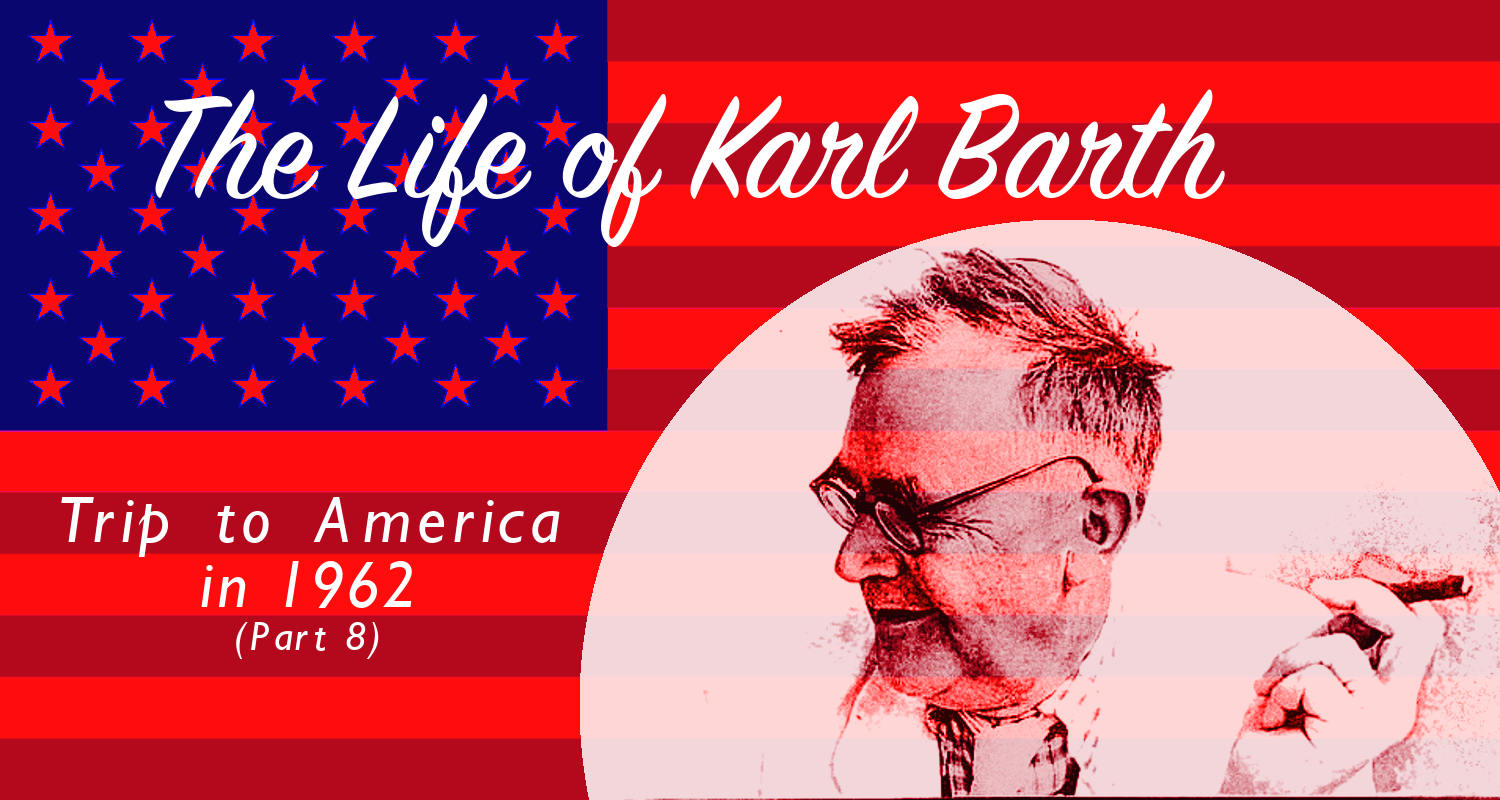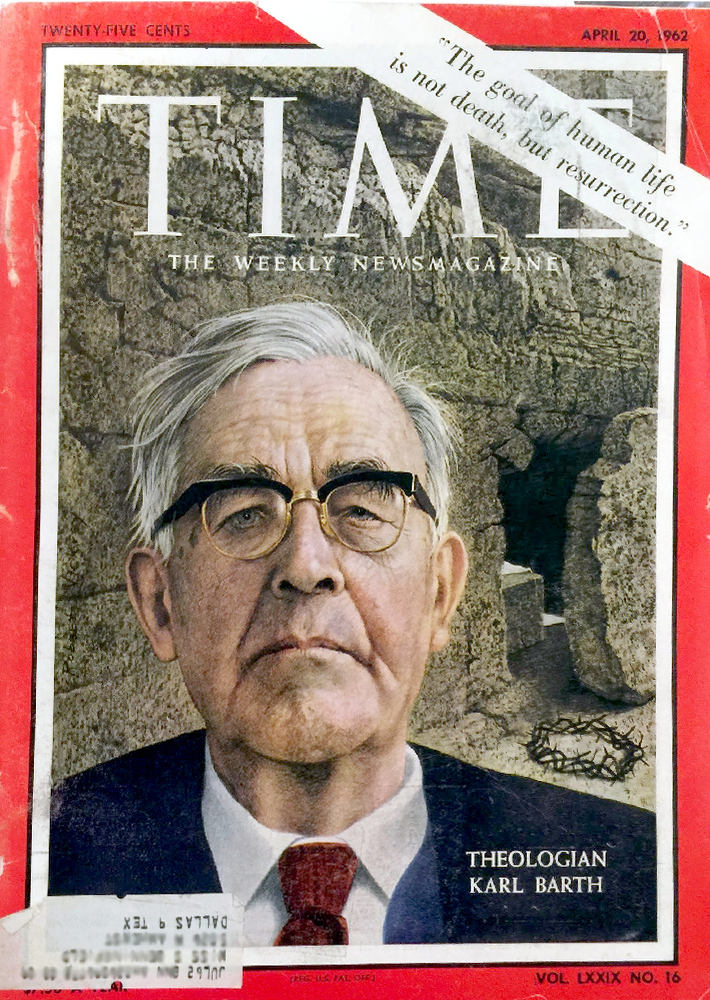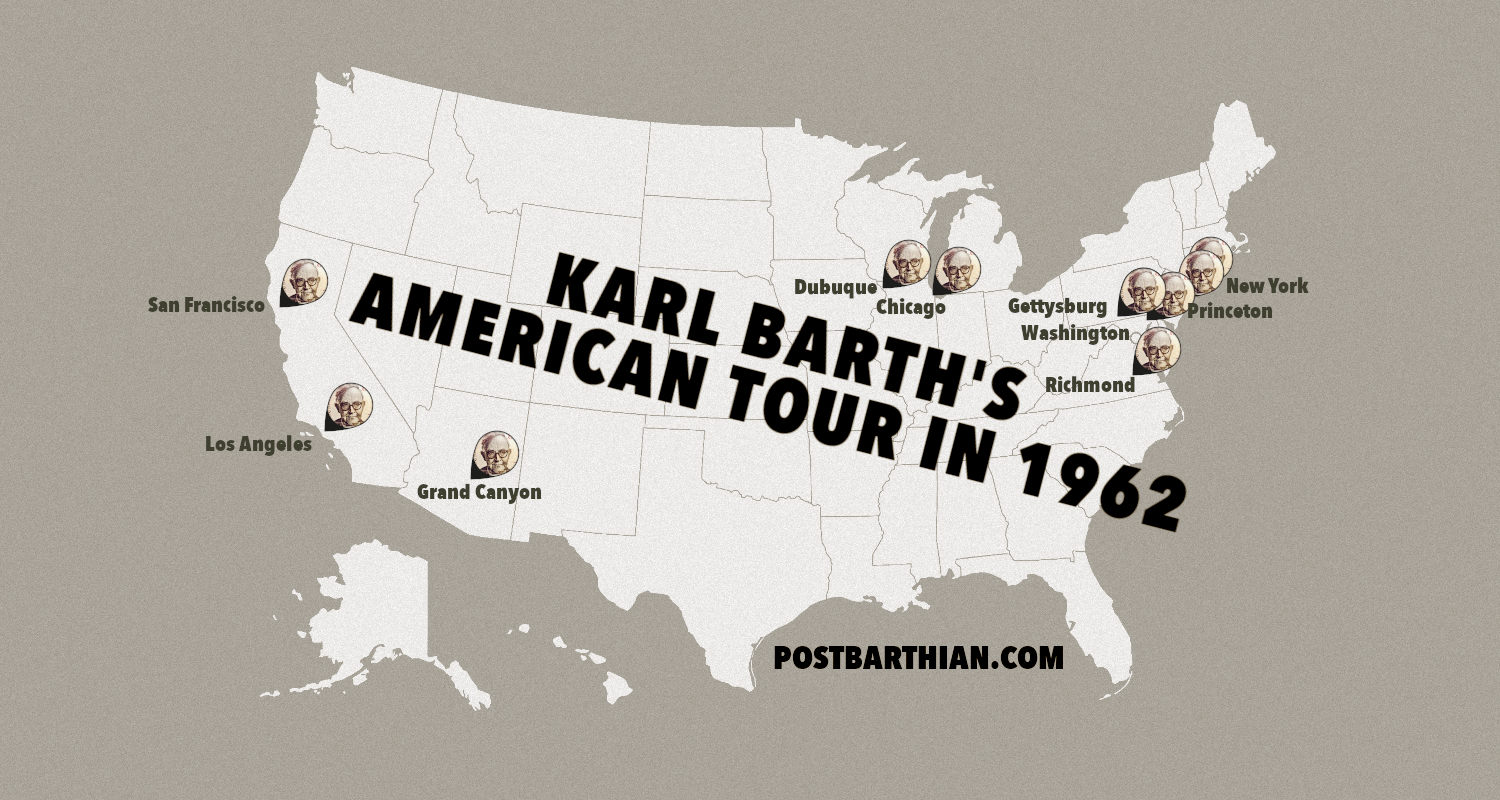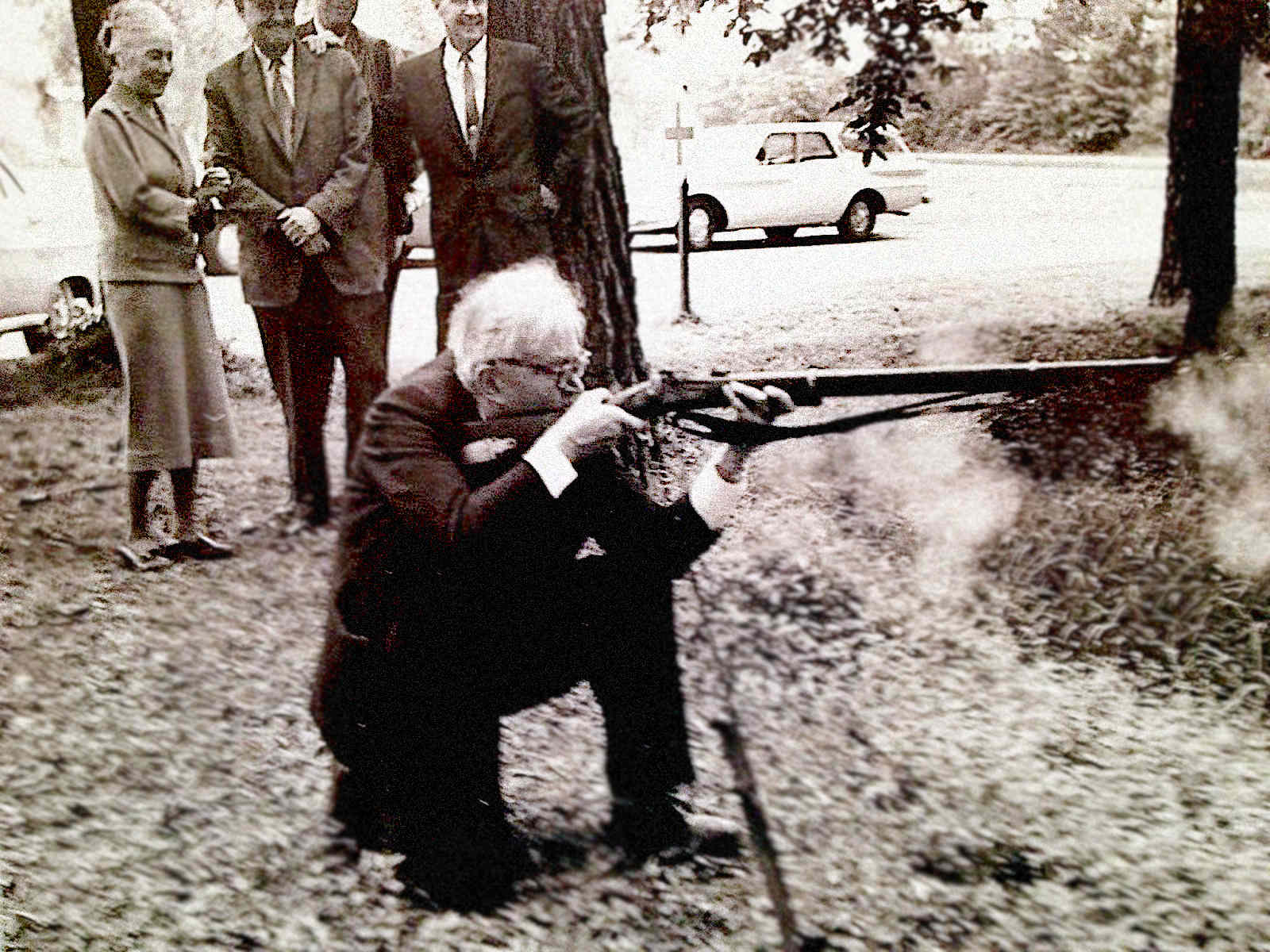
Trip to America in 1962
In 1962 and at the age of 75, Karl Barth was Coming to America at last! Barth had recently retired from the University of Basel and decided to take a seven week trip to lecture throughout the United States. [1]. Barth's trip to America introduced him to the english speaking world and caused an immediate sensation across the states. In Part 5 of this series, I mentioned that Barth previously only known through the criticism of his english speaking enemies, and this trip completely overturned that bad reputation, and introduced Karl Barth to Americans.
Karl Barth's journey trip in the USA
Karl Barth's son Markus Barth was the Professor of New Testament Theology at the University of Chicago, and encouraged his father Karl to visit him and tour the United States of America together [2]. Karl Barth and Charlotte Von Kirschbaum (Lollo) travelled to Chicago shortly after he had retired, and they stayed with Markus Barth for three weeks before embarking on their trip around the states for the first time ever.
Three weeks in Chicago
 While he was still in Chicago, Karl Barth was featured in Time's magazine's Apr 20th, 1962 issue with a cover photo and a featured five-page article titled "Witness to an Ancient Truth". Time said Barth was "A Calvinist--but not a gloomy one" and called him "the Red pastor." Here is a selection from this Time article:
While he was still in Chicago, Karl Barth was featured in Time's magazine's Apr 20th, 1962 issue with a cover photo and a featured five-page article titled "Witness to an Ancient Truth". Time said Barth was "A Calvinist--but not a gloomy one" and called him "the Red pastor." Here is a selection from this Time article:
Love & Scorn. Last week, at the age of 75, the author of this challenge to modern skepticism as enjoying his first visit to the U.S.--a country whose history he loves and whose way of life he professes to scorn. Arriving in Chicago, Barth quickly found time to check theatrical versions of that life, saw performances of two plays by Edward Albee, and the current review of the iconoclastic troupe that performs in a coffeehouse-nightclub called The Second City. Among Protestant theologians, Barth's arrival has caused as much stir as would a visit by the Pope to a Jesuit convention. At the University of Chicago, Barth will receive an honorary doctorate of divinity, deliver five lectures on evangelical theology. Busloads of theologians and ministers are coming from as far as New Mexico and California in hopes of hearing him. A week later Barth will repeat the lectures at Princeton Theological Seminary. Oddly enough, Barth is as interested in seeing battlefields as debating with his fellow theologians. An amateur expert on the Civil War, he has insisted that his travels include a stop at Gettysburg. [3]
Four week American tour
Karl Barth's first excursion away from Chicago was to the University of Dubuque (where Markus Barth had also been a professor)[4]. After Chicago, they flew to Princeton where Karl Barth gave his famous Warfield lectures (available online), and these lectures form the first chapters of his famous book Evangelical Theology: An Introduction (which is ironically the first Karl Barth book read by many anglophiles to this day).
Karl Barth, Lollo and Markus spent the next four weeks visiting and lecturing in many cities on the east and west coasts including Washington, Richmond, Los Angeles, San Francisco and New York City, and many many famous people including Billy Graham, Mircea Eliada, Jaroslav Pelikan, William Stringfellow, Martin Luther King, Jr., August R. Lindt, and members of President Kennedy's staff. Barth also visited and lectured at many universities including Union Theological Seminary, and Lutheran Seminary, San Francisco Theological Seminary [5]. Karl Barth also visited many American landmarks including the Grand Canyon, the Golden Gate Bridge, and the battle of Gettysburg. Barth had always been fascinated with the American Civil War (perhaps due to the parallels he experienced during Germany), and so he visited an old Civil War fort on the St. James river where he fired a century old Civil War musket. Barth also toured American prisons and compared them to Dante's inferno. [6]
A map of the cities Karl Barth visited

Karl Barth firing a Civil War gun and Charlotte von Kirschbaum is in the background

Karl Barth and Martin Luther King Jr.

Theology of Freedom
Karl Barth said he wished to write a ‘theology of freedom’ if he was an American. "A theology of freedom from any inferiority complex over against 'good old Europe'" and "demythologizing the statue of liberty to be an expression of the coming freedom, which by contrast would be based on the freedom for which ‘the Son’ makes men free." [7]
As an endnote, I was disappointed that the Universities at Dubuque, Chicago, San Anselmo, Lutheran Seminary, and Union Seminary had sparse to nil references to Karl Barth (or Markus Barth). Princeton University has set a bold example by establishing the Center for Barth Studies, and I pray these other universities emulate Princeton in the future.
To be continued...
The Life of Karl Barth series:
- The Life of Karl Barth: Early Life from Basel to Geneva 1886-1913 (Part 1)
- The Life of Karl Barth: The Red Pastor of Safenwil 1909-1921 (Part 2)
- The Life of Karl Barth: The Romans road to the Church Dogmatics 1921-1930 (Part 3)
- The Life of Karl Barth: Protesting in Nazi Germany 1930-1935 (Part 4)
- The Life of Karl Barth: Professor of Systematic Theology at the University of Basel during World War II 1935-1946 (Part 5)
- The Life of Karl Barth: Church Dogmatics Vol III: The Doctrine of Creation 1945-1951 (Part 6)
- The Life of Karl Barth: Church Dogmatics Vol IV: The Doctrine of Reconciliation 1953-1967 (Part 7)
- The Life of Karl Barth: Trip to America in 1962 (Part 8)
- Coming soon . . .
Sources:
1. The Center for Barth Studies <http://barth.ptsem.edu/karl-barth/biography>
2. The Center for Barth Studies. Ibid.
3. Time Magazine. "Witness to an Ancient Truth", April 20, 1962. p. 59
4. Princeton Theological Seminary <http://barth.ptsem.edu/event/markus-barth-symposium>
5. The Center for Barth Studies. Ibid.
6. Busch, Eberhard. Karl Barth: His Life from Letters and Autobiographical Texts. W.B. Eerdmans Pub. Co., 1994. Print. 459.
6. Busch, Eberhard. Ibid.
7. Copyright of images of Martin Luther King Jr. with Barth and Barth firing the musket is unknown. (Possibly the Karl Barth Archiv)
Related: 1962, America, August R. Lindt, Billy Graham, Jaroslav Pelikan, Karl Barth, Martin Luther King Jr., Mircea Eliada, Trip to America, William Stringfellow



February 18th, 2022 - 15:14
When was Karl Barth scheduled to speak at the Plymouth Avenue Christian Reformed Church in Grand Rapids, Michigan? Scores of us were waiting for many anxious minutes beyond the scheduled time, with no Karl Barth appearing. After our long wait Markus Barth appeared at the podium and uttered the deathless sentence, “My father is indisposed.” What was the date of that (non)-event?